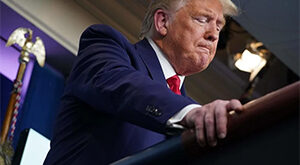WASHINGTON — President Trump said Thursday he will soon place tariffs on steel and aluminum imports — a move that could trigger retaliation from trade partners who may target American products.
“We’ll probably see you sometime next week — we’ll be signing it in,” Trump said after discussing tariffs with a group of steel and aluminum executives. “And you will have protection for the first time in a long while.”
While arguing that the United States has been treated “horribly treated by other countries,” Trump also told the executives that “you’re going to regrow your industries. That’s all I’m asking.”
Trump told reporters he would impose 25% percent tariffs on steel imports and 10% on aluminum imports, but provided no further details.
Skeptics, including some Republican lawmakers, quickly objected by saying that trading partners and rivals would slap counter-tariffs on U.S. products and increase costs worldwide.
“The President is proposing a massive tax increase on American families,” said Sen. Ben Sasse, R-Neb., adding that “you’d expect a policy this bad from a leftist administration, not a supposedly Republican one.”
Sen. Orrin Hatch, R-Utah, a frequent supporter of Trump, also denounced what he called “a tax hike the American people don’t need and can’t afford,” and he urged the president to reconsider.
The American International Automobile Dealers Association said car sales are already flat, and “the burden of these tariffs, as always, will be passed on to the American consumer.”
The Dow Jones industrial average fell more than 350 points in the hours after Trump’s comments.
Proposed tariffs have also drawn objections from members of Trump’s staff, ranging from White House economic adviser Gary Cohn to Secretary of State Rex Tillerson.
White House spokeswoman Sarah Sanders said Trump is sticking up for the American worker. She also said no one should be surprised by the announcement, and that Trump campaigned for president on the issue of higher tariffs.
“This is something the president has wanted to do for quite some time,” Sanders said.
Our Steel and Aluminum industries (and many others) have been decimated by decades of unfair trade and bad policy with countries from around the world. We must not let our country, companies and workers be taken advantage of any longer. We want free, fair and SMART TRADE!
— Donald J. Trump (@realDonaldTrump) March 1, 2018
Earlier in the morning, Trump had tweeted: “Our Steel and Aluminum industries (and many others) have been decimated by decades of unfair trade and bad policy with countries from around the world. We must not let our country, companies and workers be taken advantage of any longer. We want free, fair and SMART TRADE!”
After a late-morning “listening session” with Commerce Secretary Wilbur Ross and 15 executives from the steel and aluminum industries, Trump pledged to formally impose tariffs next week; many of his guests applauded.
While China is the prime target, other countries will also be affected. White House officials said details are still being worked out, including which countries will be targeted and whether there will be an exemptions.
“I want to keep prices down, but I also want to make sure that we have a steel industry and an aluminum industry, and we do need that for national defense,” Trump said last month. “If we ever have a conflict, we don’t want to be buying the steel from a country that we’re fighting, because somehow that doesn’t work very well.”
In mid-February, the Commerce Department gave Trump options that included tariffs of at least 24% on steel and 7.7% on aluminum, with higher penalties on certain countries, including China.
Trump based much of his 2016 presidential campaign on claims that trade policies of China and other countries have undercut the United States, particularly its manufacturing sector. That argument won support in industrial areas of Pennsylvania and Michigan, two states that helped Trump win the election over Democrat Hillary Clinton.
Noting that Trump has often called for trade that is “free, fair, and reciprocal,” a White House statement on tariffs said the Commerce Department “determined that the quantities of imported steel and aluminum represent potential threats to our national security.”
The president “is considering several proposals — including quotas and tariffs — to adjust steel and aluminum import levels and keep our Nation secure,” the White House said.
Critics said Trump tariffs would invite retaliation from other countries, who may use tariffs on their own to target American products ranging from Kentucky bourbon to Wisconsin cheese to Florida orange juice.
“These tariffs would undoubtedly raise costs for U.S. businesses that rely heavily on steel and aluminum for the majority of their products — and ultimately consumers,” said Jack Gerard, president and CEO of the American Petroleum Institute.
 South Asian Gazette Worldwide News Work
South Asian Gazette Worldwide News Work




